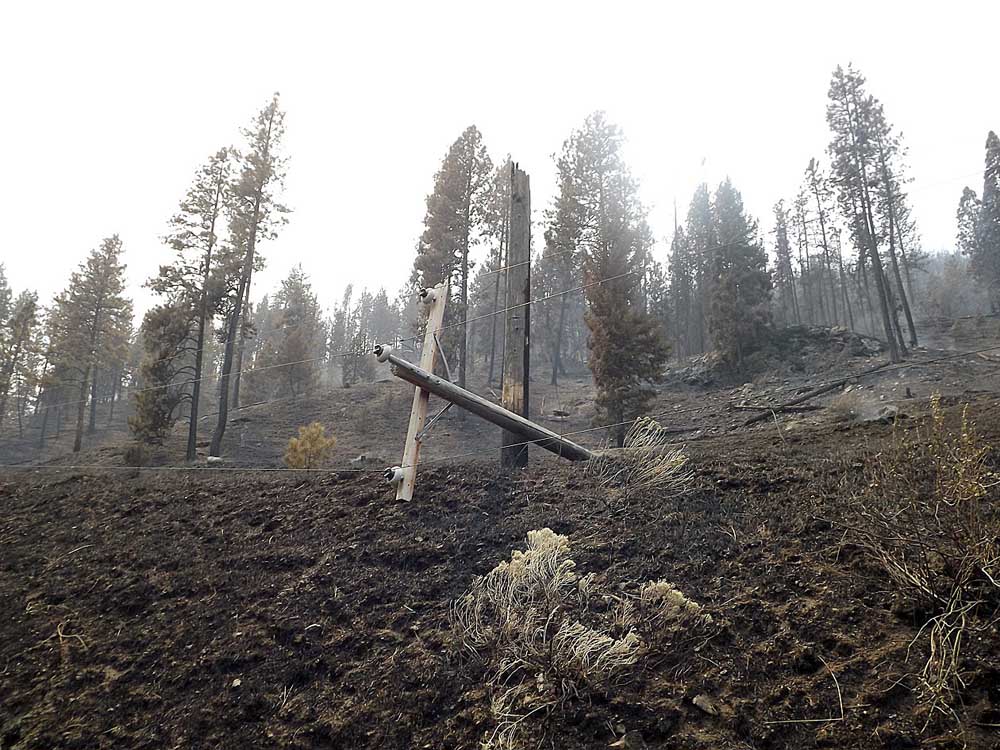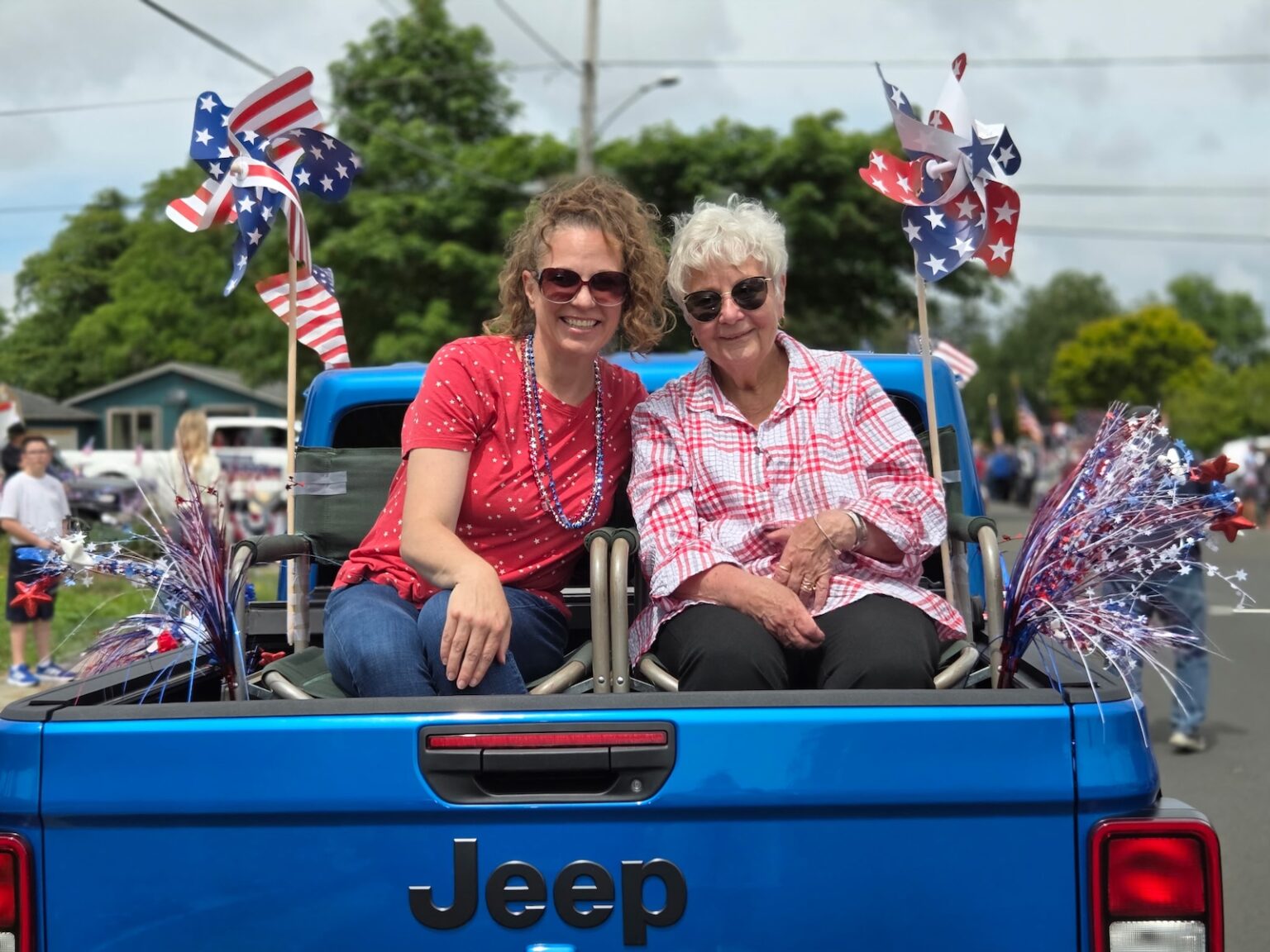Community opens their hearts and homes to fire victims
Published 8:00 pm Thursday, September 3, 2015

- Miles of power poles operated by the Oregon Trail Electric Co-op have burned to the ground, and wildfire activity so far is preventing the co-op from being able to replace them.
As fire roared through Canyon Creek and over the hills just south of John Day, those who were ordered to evacuate recall details they probably never will forget.
Dean Elliott, who lost his home of 53 years, remembers the sound of the wind. It was like a locomotive, he said.
Trending
His wife, Betty, recalls how the oxygen was sucked out of the air and she could hardly breathe.
Mike Mannell, who was woken by a friend, tells how he ran through the smoke to put a sprinkler on his Harley-Davidson and another sprinkler on his neighbor’s house.
If his friend hadn’t woken him that morning, says Mannell, whose cabin he had been building for six years burned to the ground, “I probably would have perished in that fire.”
And with tears in his eyes, the neighbor, Bryan Nelson, whose home Mannell saved, calls Mannell a “hero.”
These stories abound in the canyon. They are told and retold to friends, relatives, restaurant waitresses, store clerks. They are told because people in this community know each other, and most importantly, they care about one another.
The fire, one mile south of John Day, has burned 69,606 acres — about 109 square miles. It has destroyed 39 homes. More than 200 people had to evacuate during the height of the fire, which started as a 10-acre brush fire Aug. 12.
For nearly two weeks, Blue Mountain Eagle staffers Cheryl Hoefler and Angel Carpenter have kept a running list of all the donations, services, offers of homes and other resources available to those who were affected by the fire. Response has been pouring into the Eagle’s Facebook page throughout the region, asking how they can help.
That’s what you do in a crisis.
Where I live — on the North Oregon Coast — we are a small community, too. Most all of us have ties to each other — through family, work, volunteer activities, civic duties or friendship.
We also have emergencies. Usually, it’s flooding or windstorms in the winter because it rains so much along the coast, where we live on a narrow band of land between forest and ocean.
Our largest, overriding concern, however, is the potential Cascadia Subduction Zone earthquake that is expected to occur 50 to 75 miles offshore and trigger a tsunami that would wipe our communities off the map.
It seems that, no matter where you live, some sort of disaster looms, threatening to destroy all we hold dear.
The difference between the North Coast and Eastern Oregon, however, is that the Cascadia earthquake happens every 300 years, and fires are a real possibility here every 300 days.
We are constantly in the emergency planning mode on the coast. We worry about where we would evacuate to escape the wall of water heading toward us 15 minutes after the earthquake drops the ground out from under us. We gather “go bags” — backpacks filled with emergency supplies; we test out evacuation routes leading toward ground higher than 80 feet and we organize Community Emergency Response Teams to help us deal with the immediate crises that will occur when people finally reach pre-established gathering spots.
After observing and reporting on how John Day and Canyon City area residents and emergency crews are responding to this crisis, I have hope that we will do just as well when disaster hits us on the coast.
The local fire departments, U.S. Forest Service, Oregon Department of Forestry, Grant County Sheriff’s Office and Red Cross all began working together to fend off the fire and keep us informed. In only a day or two, when it was obvious the fire couldn’t be controlled locally, nearly 1,000 firefighters from throughout the region responded, and two incident commanders trained to supervise massive wildfires took charge.
Meanwhile, local volunteers opened their hearts, wallets and homes to those who needed immediate help.
Where I live, they say not to count on outside help being able to reach us for several weeks — or even months. We will be on our own to cope.
This experience, in this small community, shows me that it can be done.
The details of our potential crisis will be different. We will have different stories to tell. Instead of a wall of fire, we may be fleeing a wall of water. Instead of fire consuming our homes, it will be an enormous ocean wave.
But I hope — and expect — the community response will be the same. We will take care of each other.
Because that’s what communities do in a crisis.
Nancy McCarthy is the former editor of the Seaside Signal and the Cannon Beach Gazette. She has been the interim editor of the Blue Mountain Eagle for the last month.






